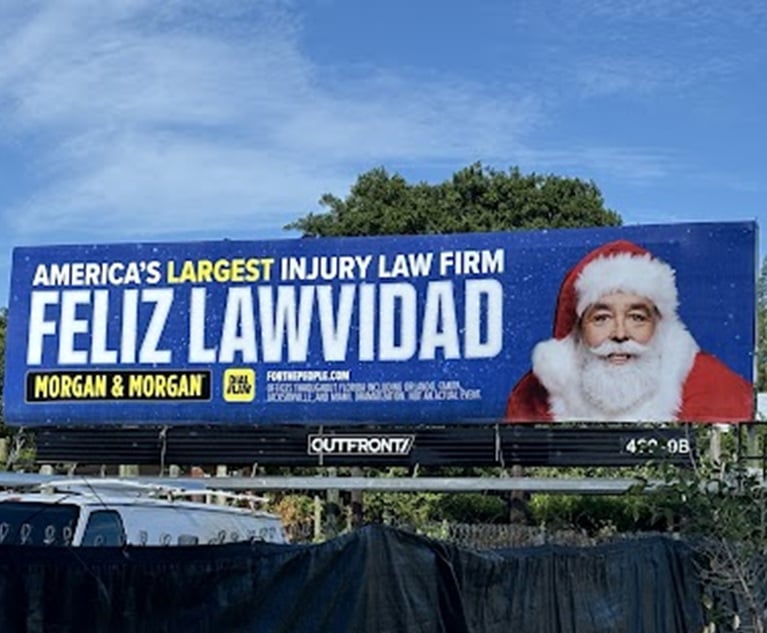 Image: Shutterstock
Image: ShutterstockHow Client Demand Is Driving Law Firms' Investment in Tech
A Dorsey/Opus 2 collaboration illustrates two emerging trends governing how law firms work with tech vendors: how tech is migrating from disputes work to areas like compliance and how client demand is shaping the tools that get built.
January 29, 2020 at 01:00 AM
4 minute read
The original version of this story was published on Legal Tech News
Caroline Sweeney, the director of knowledge management and innovation at Dorsey & Whitney, tells the story of a newly arrived partner at the firm with a quandary. He'd had an application built for a client at his old firm, and his move meant he'd need to start from scratch on a training and testing platform the company's compliance officer used for regulatory compliance.
While Dorsey has built a number of tech tools internally, Sweeney thought this one would be best suited for an external vendor. She and the partner sat down with Graham Smith-Bernal and Raymond Bentinck of tech provider Opus 2, which the firm had first started using for transcript management and data room hosting, and sketched out his needs. They then built out a new platform that's now being used by over 100 employees.
The process illustrates two emerging trends governing how law firms work with outside technology vendors: how tech is migrating from disputes work to areas like compliance and how client demand is shaping the tools that get built.
"So much of this is driven by clients expressing a need or an attorney identifying a need that a client has and coming to us and saying, 'How can we do this?'" Sweeney said.
Opus 2 CEO Smith-Bernal, a former court reporter who in 2007 sold his transcript and evidence management software tool LiveNote to Thomson Reuters for a reported £75 million, said lawyers are just beginning to turn to technology that not only increases efficiency but allows them to differentiate themselves from their competition.
"Our sweet spot is developing tools for what I call the people at the bridge of the ship, the lawyers, can use," he said, differentiating the figures responsible for determining the course of a lawsuit or a deal from those in the "engine room" who help power it to the desired destination.
Putting technology in the hands of the lawyers, Opus 2 chief operating officer Bentinck argues, can set law firms apart from the growing competition from alternative legal service providers, as well as the Big Four.
"What we're looking to do is to future-proof firms, and cement the bond between the firm and their clients," Bentinck said. "They really do need to use technology to enhance their relationships with clients, but also to add value to the clients."
Opus 2′s earliest offerings, just like those of LiveNote, zeroed in on supporting firms' litigation efforts. The company's leaders say they are now targeting new areas for "future-proofing"—with regulatory compliance being one key example.
Bentinck described how the company is helping firms set up portals that provide an alternative to email for sharing confidential documents with clients and allow real-time collaboration, while also erecting Chinese walls that ensure information is not shared across other arms of the organization or with other regulators.
For one specific example, he referenced a firm representing an energy client building an inter-country pipeline, requiring it to interact with the Federal Energy Regulatory Commission and other regulators. At Dorsey & Whitney, Sweeney also highlighted the company's work in crafting a virtual data room for the firm's mergers and acquisitions offerings and a platform for contract management.
The firm isn't adverse to building its own tools: notably, a financial portal that allows clients to track their spending and drill down into how diverse staffing is, among other indicators.
But Bernal-Smith, for his part, cautions that in most circumstances, clients should be wary of proprietary tools built by law firms themselves.
"Some of them are quite good, but they don't last so long," he said. "They're closed systems only available to that law firm. That's the death warrant."
For Sweeney, her firm's immediate focus is now on ensuring that its lawyers are comfortable with the tools that are now at their disposal. But Dorsey is also looking to harness the stockpile of data at its disposal to determine what the next move is.
"[We're] figuring out what we can do with the data that we have to inform what tools we can develop for clients and to inform how we price matters," she said.
This content has been archived. It is available through our partners, LexisNexis® and Bloomberg Law.
To view this content, please continue to their sites.
Not a Lexis Subscriber?
Subscribe Now
Not a Bloomberg Law Subscriber?
Subscribe Now
NOT FOR REPRINT
© 2024 ALM Global, LLC, All Rights Reserved. Request academic re-use from www.copyright.com. All other uses, submit a request to [email protected]. For more information visit Asset & Logo Licensing.
You Might Like
View All
Pa. Judicial Nominee Advances While Trump Demands GOP Unity Against Biden Picks
4 minute read
Morgan & Morgan Looks to Grow Into Complex Litigation While Still Keeping its Billboards Up
5 minute read
‘What’s Up With Morgan & Morgan?’ Law, Advertising and a Calculated Rise
10 minute read
Pa. Firms Set to Finish Year Strong, Thanks to Demand Uptick, Shorter Collections Cycle
4 minute readTrending Stories
Who Got The Work
Michael G. Bongiorno, Andrew Scott Dulberg and Elizabeth E. Driscoll from Wilmer Cutler Pickering Hale and Dorr have stepped in to represent Symbotic Inc., an A.I.-enabled technology platform that focuses on increasing supply chain efficiency, and other defendants in a pending shareholder derivative lawsuit. The case, filed Oct. 2 in Massachusetts District Court by the Brown Law Firm on behalf of Stephen Austen, accuses certain officers and directors of misleading investors in regard to Symbotic's potential for margin growth by failing to disclose that the company was not equipped to timely deploy its systems or manage expenses through project delays. The case, assigned to U.S. District Judge Nathaniel M. Gorton, is 1:24-cv-12522, Austen v. Cohen et al.
Who Got The Work
Edmund Polubinski and Marie Killmond of Davis Polk & Wardwell have entered appearances for data platform software development company MongoDB and other defendants in a pending shareholder derivative lawsuit. The action, filed Oct. 7 in New York Southern District Court by the Brown Law Firm, accuses the company's directors and/or officers of falsely expressing confidence in the company’s restructuring of its sales incentive plan and downplaying the severity of decreases in its upfront commitments. The case is 1:24-cv-07594, Roy v. Ittycheria et al.
Who Got The Work
Amy O. Bruchs and Kurt F. Ellison of Michael Best & Friedrich have entered appearances for Epic Systems Corp. in a pending employment discrimination lawsuit. The suit was filed Sept. 7 in Wisconsin Western District Court by Levine Eisberner LLC and Siri & Glimstad on behalf of a project manager who claims that he was wrongfully terminated after applying for a religious exemption to the defendant's COVID-19 vaccine mandate. The case, assigned to U.S. Magistrate Judge Anita Marie Boor, is 3:24-cv-00630, Secker, Nathan v. Epic Systems Corporation.
Who Got The Work
David X. Sullivan, Thomas J. Finn and Gregory A. Hall from McCarter & English have entered appearances for Sunrun Installation Services in a pending civil rights lawsuit. The complaint was filed Sept. 4 in Connecticut District Court by attorney Robert M. Berke on behalf of former employee George Edward Steins, who was arrested and charged with employing an unregistered home improvement salesperson. The complaint alleges that had Sunrun informed the Connecticut Department of Consumer Protection that the plaintiff's employment had ended in 2017 and that he no longer held Sunrun's home improvement contractor license, he would not have been hit with charges, which were dismissed in May 2024. The case, assigned to U.S. District Judge Jeffrey A. Meyer, is 3:24-cv-01423, Steins v. Sunrun, Inc. et al.
Who Got The Work
Greenberg Traurig shareholder Joshua L. Raskin has entered an appearance for boohoo.com UK Ltd. in a pending patent infringement lawsuit. The suit, filed Sept. 3 in Texas Eastern District Court by Rozier Hardt McDonough on behalf of Alto Dynamics, asserts five patents related to an online shopping platform. The case, assigned to U.S. District Judge Rodney Gilstrap, is 2:24-cv-00719, Alto Dynamics, LLC v. boohoo.com UK Limited.
Featured Firms
Law Offices of Gary Martin Hays & Associates, P.C.
(470) 294-1674
Law Offices of Mark E. Salomone
(857) 444-6468
Smith & Hassler
(713) 739-1250





